英语常用短语的用法与练习(1)
- 格式:docx
- 大小:20.12 KB
- 文档页数:8
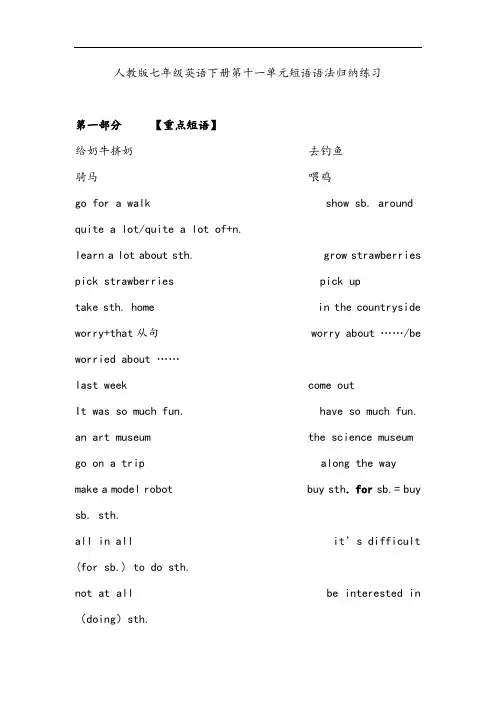
人教版七年级英语下册第十一单元短语语法归纳练习第一部分【重点短语】给奶牛挤奶去钓鱼骑马喂鸡go for a walk show sb. aroundquite a lot/quite a lot of+n.learn a lot about sth. grow strawberriespick strawberries pick uptake sth. home in the countrysideworry+that从句 worry about ……/beworried about ……last week come out It was so much fun. have so much fun. an art museum the science museumgo on a trip along the waymake a model robot buy sth. for sb.= buysb. sth.all in all it’s difficult(for sb.) to do sth.not at all be interested in(doing)sth.【答案】从左至右:milk a cow; go fishing; ride a horse; feed chickens; 去散步=take a walk;带领某人参观;相当多的;关于…学到很多;种草莓;摘草莓;捡起/接某人;带…回家; 在农村;担心……; 担心某人某事;上周;出来/出版/开花;如此有趣;玩得非常开心;一个艺术博物馆;科学博物馆;去旅行;沿途;制作一个机器人模型;为某人买某物;总之;对某人来说做某事很困难;根本不/一点也不;对(做)…感兴趣第二部分【重点语法】一、一般过去时1.定义一般过去时表示过去某个时间或一段时间内发生的动作或状态;也可表示过去经常或反复发生的动作。
e.g.I got up at 7:00 yesterday. 我昨天7点起床。
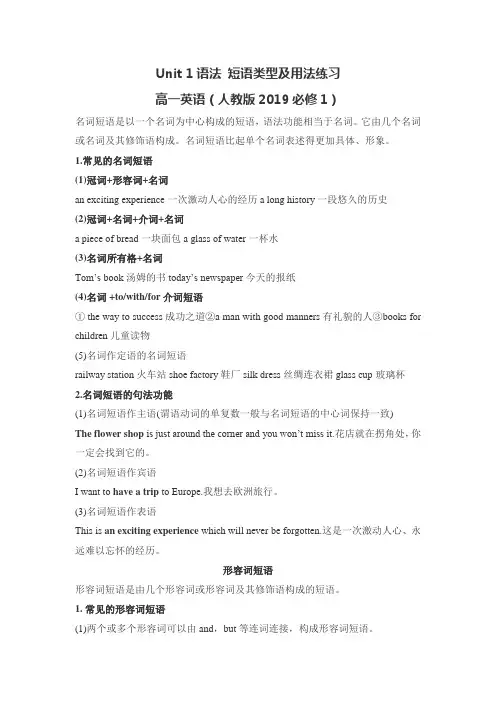
Unit 1语法短语类型及用法练习高一英语(人教版2019必修1)名词短语是以一个名词为中心构成的短语,语法功能相当于名词。
它由几个名词或名词及其修饰语构成。
名词短语比起单个名词表述得更加具体、形象。
1.常见的名词短语(1)冠词+形容词+名词an exciting experience一次激动人心的经历 a long history 一段悠久的历史(2)冠词+名词+介词+名词a piece of bread一块面包 a glass of water一杯水(3)名词所有格+名词Tom’s book 汤姆的书today’s newspaper今天的报纸(4)名词 +to/with/for介词短语① the way to success 成功之道②a man with good manners有礼貌的人③books for children 儿童读物(5)名词作定语的名词短语railway station 火车站 shoe factory 鞋厂silk dress 丝绸连衣裙 glass cup玻璃杯2.名词短语的句法功能(1)名词短语作主语(谓语动词的单复数一般与名词短语的中心词保持一致)The flower shop is just around the corner and you won’t miss it.花店就在拐角处,你一定会找到它的。
(2)名词短语作宾语I want to have a trip to Europe.我想去欧洲旅行。
(3)名词短语作表语This is an exciting experience which will never be forgotten.这是一次激动人心、永远难以忘怀的经历。
形容词短语形容词短语是由几个形容词或形容词及其修饰语构成的短语。
1. 常见的形容词短语(1)两个或多个形容词可以由and,but等连词连接,构成形容词短语。
safe and sound安然无恙young but clever年纪小但聪明(2)very等程度副词作修饰语时,可与形容词构成形容词短语,以加深形容词的程度。
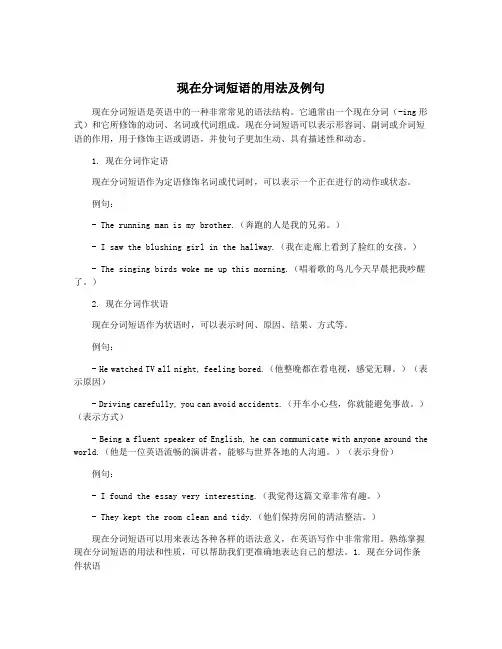
现在分词短语的用法及例句现在分词短语是英语中的一种非常常见的语法结构。
它通常由一个现在分词(-ing形式)和它所修饰的动词、名词或代词组成。
现在分词短语可以表示形容词、副词或介词短语的作用,用于修饰主语或谓语,并使句子更加生动、具有描述性和动态。
1. 现在分词作定语现在分词短语作为定语修饰名词或代词时,可以表示一个正在进行的动作或状态。
例句:- The running man is my brother.(奔跑的人是我的兄弟。
)- I saw the blushing girl in the hallway.(我在走廊上看到了脸红的女孩。
)- The singing birds woke me up this morning.(唱着歌的鸟儿今天早晨把我吵醒了。
)2. 现在分词作状语现在分词短语作为状语时,可以表示时间、原因、结果、方式等。
例句:- He watched TV all night, feeling bored.(他整晚都在看电视,感觉无聊。
)(表示原因)- Driving carefully, you can avoid accidents.(开车小心些,你就能避免事故。
)(表示方式)- Being a fluent speaker of English, he can communicate with anyone around the world.(他是一位英语流畅的演讲者,能够与世界各地的人沟通。
)(表示身份)例句:- I found the essay very interesting.(我觉得这篇文章非常有趣。
)- They kept the room clean and tidy.(他们保持房间的清洁整洁。
)现在分词短语可以用来表达各种各样的语法意义,在英语写作中非常常用。
熟练掌握现在分词短语的用法和性质,可以帮助我们更准确地表达自己的想法。
1. 现在分词作条件状语当现在分词短语与 if 或 when 连用时,可以表示一个条件或情况。
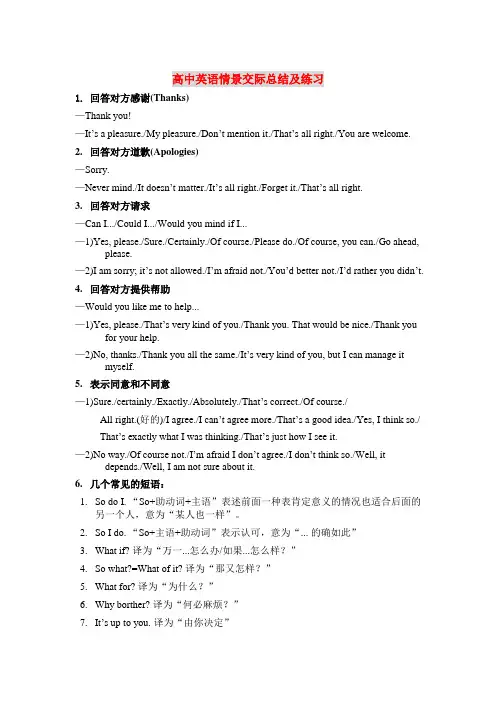
高中英语情景交际总结及练习1.回答对方感谢(Thanks)—Thank you!—It’s a pleasure./My pleasure./Don’t mention it./That’s all right./You are welcome. 2.回答对方道歉(Apologies)—Sorry.—Never mind./It doesn’t matter./It’s all right./Forget it./That’s all right.3.回答对方请求—Can I.../Could I.../Would you mind if I...—1)Yes, please./Sure./Certainly./Of course./Please do./Of course, you can./Go ahead, please.—2)I am sorry; it’s not allowed./I’m afraid not./You’d better not./I’d rather you didn’t.4.回答对方提供帮助—Would you like me to help...—1)Yes, please./That’s very kind of you./Thank you. That would be nice./Thank you for your help.—2)No, thanks./Thank you all the same./It’s very kind of you, but I can manage it myself.5.表示同意和不同意—1)Sure./certainly./Exactly./Absolutely./That’s correct./Of course./All right.(好的)/I agree./I can’t agree more./That’s a good idea./Yes, I think so./ That’s exactly what I was thinking./That’s just how I see it.—2)No way./Of course not./I’m afraid I don’t agree./I don’t think so./Well, it depends./Well, I am not sure about it.6.几个常见的短语:1.So do I. “So+助动词+主语”表述前面一种表肯定意义的情况也适合后面的另一个人,意为“某人也一样”。
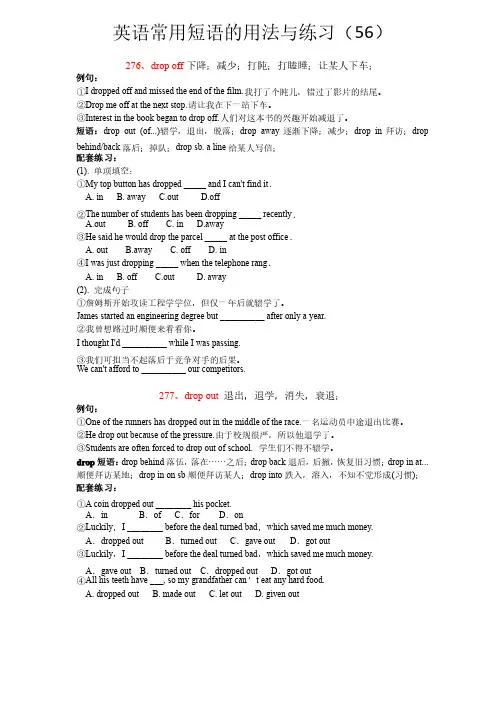
英语常用短语的用法与练习(56)276、drop off 下降;减少;打盹;打瞌睡;让某人下车;下降;减少;打盹;打瞌睡;让某人下车;例句:①I dropped off and missed the end of the film.我打了个盹儿,错过了影片的结尾。
我打了个盹儿,错过了影片的结尾。
②Drop me off at the next stop.请让我在下一站下车。
请让我在下一站下车。
③Interest in the book began to drop off.人们对这本书的兴趣开始减退了。
人们对这本书的兴趣开始减退了。
短语:drop out (of...)辍学,退出,脱落;drop away 逐渐下降;减少;drop in 拜访;drop behind/back 落后;掉队;drop sb. a line 给某人写信;给某人写信; 配套练习:(1). 单项填空:单项填空:①My top button has dropped _____ and I can't find it .A. inB. awayC.outD.off②The number of students has been dropping _____ recently .A.outB. offC. inD.away③He said he would drop the parcel _____ at the post office .A. outB.awayC. offD. in④I was just dropping _____ when the telephone rang .A. inB. offC.outD. away(2). 完成句子完成句子①詹姆斯开始攻读工程学学位,但仅一年后就辍学了。
①詹姆斯开始攻读工程学学位,但仅一年后就辍学了。
James started an engineering degree but __________ after only a year.②我曾想路过时顺便来看看你。
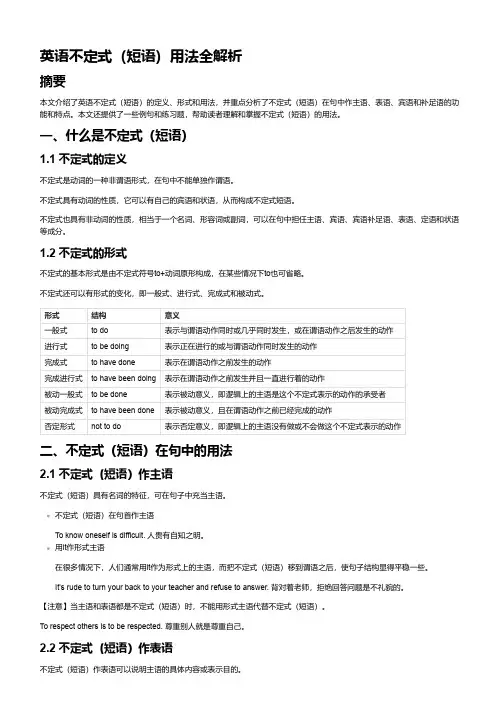
英语不定式(短语)用法全解析摘要本文介绍了英语不定式(短语)的定义、形式和用法,并重点分析了不定式(短语)在句中作主语、表语、宾语和补足语的功能和特点。
本文还提供了一些例句和练习题,帮助读者理解和掌握不定式(短语)的用法。
一、什么是不定式(短语)1.1 不定式的定义不定式是动词的一种非谓语形式,在句中不能单独作谓语。
不定式具有动词的性质,它可以有自己的宾语和状语,从而构成不定式短语。
不定式也具有非动词的性质,相当于一个名词、形容词或副词,可以在句中担任主语、宾语、宾语补足语、表语、定语和状语等成分。
1.2 不定式的形式不定式的基本形式是由不定式符号to+动词原形构成,在某些情况下to也可省略。
不定式还可以有形式的变化,即一般式、进行式、完成式和被动式。
形式结构意义一般式to do表示与谓语动作同时或几乎同时发生,或在谓语动作之后发生的动作进行式to be doing表示正在进行的或与谓语动作同时发生的动作完成式to have done表示在谓语动作之前发生的动作完成进行式to have been doing表示在谓语动作之前发生并且一直进行着的动作被动一般式to be done表示被动意义,即逻辑上的主语是这个不定式表示的动作的承受者被动完成式to have been done表示被动意义,且在谓语动作之前已经完成的动作否定形式not to do表示否定意义,即逻辑上的主语没有做或不会做这个不定式表示的动作二、不定式(短语)在句中的用法2.1 不定式(短语)作主语不定式(短语)具有名词的特征,可在句子中充当主语。
不定式(短语)在句首作主语To know oneself is difficult. 人贵有自知之明。
用it作形式主语在很多情况下,人们通常用it作为形式上的主语,而把不定式(短语)移到谓语之后,使句子结构显得平稳一些。
It's rude to turn your back to your teacher and refuse to answer. 背对着老师,拒绝回答问题是不礼貌的。
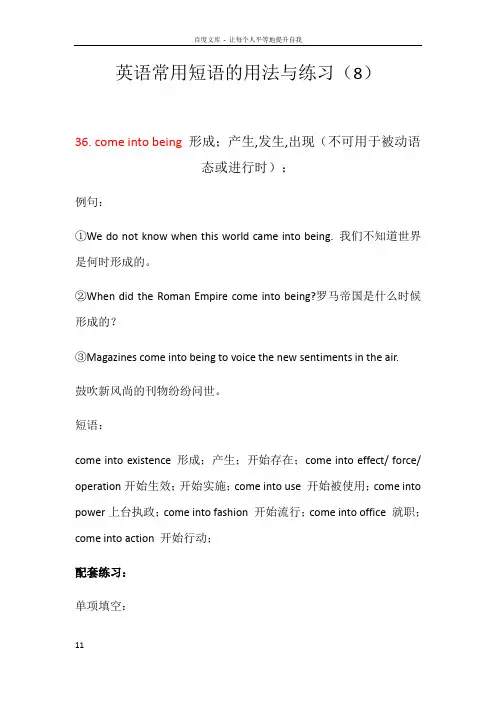
英语常用短语的用法与练习(8)36. come into being 形成;产生,发生,出现(不可用于被动语态或进行时);例句:①We do not know when this world came into being. 我们不知道世界是何时形成的。
②When did the Roman Empire come into being?罗马帝国是什么时候形成的?③Magazines come into being to voice the new sentiments in the air.鼓吹新风尚的刊物纷纷问世。
短语:come into existence 形成;产生;开始存在;come into effect/ force/ operation开始生效;开始实施;come into use 开始被使用;come into power上台执政;come into fashion 开始流行;come into office 就职;come into action 开始行动;配套练习:单项填空:①Before the computer ____ , people could never imagine it could bring about such great changes to human life.A. came into beingB. was discoveredC. was come into beingD. was formed②Once a bad man comes into _____, the people of that country will suffer a lot.A. energyB. officeC. powerD. nation③It is said that this old building has _____ for more than three hundred years.A.existedB.appearedC.been builte into being④Do you know when did the world _____?A. come into beingB. comeC. formedD. existed37. come to life 复活;苏醒;变得活跃;恢复生气;例句:①I love to watch everything come to life in spring. 我喜欢看到春天万象更新。
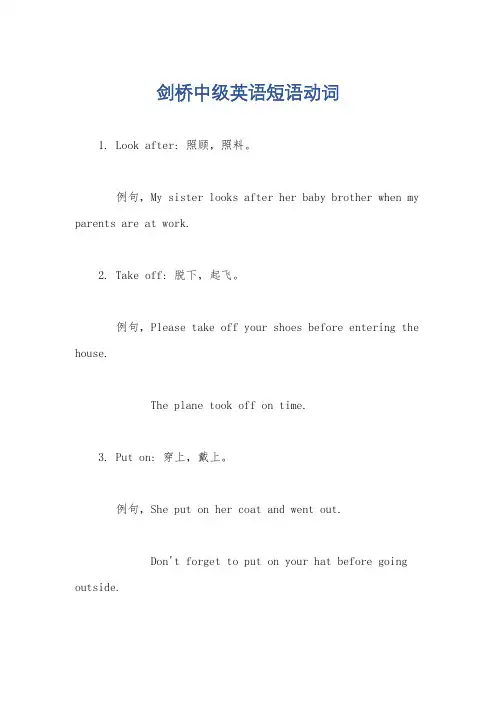
剑桥中级英语短语动词1. Look after: 照顾,照料。
例句,My sister looks after her baby brother when my parents are at work.2. Take off: 脱下,起飞。
例句,Please take off your shoes before entering the house.The plane took off on time.3. Put on: 穿上,戴上。
例句,She put on her coat and went out.Don't forget to put on your hat before going outside.4. Set up: 建立,设立。
例句,They set up a new company last year.The government plans to set up a committee to investigate the issue.5. Give up: 放弃。
例句,He gave up smoking after many years.Don't give up! Keep trying!6. Look forward to: 期待。
例句,I look forward to meeting you next week.They are looking forward to their vacation.7. Get on: 上车,相处。
例句,She got on the bus and found a seat.I get on well with my colleagues.8. Turn off: 关闭。
例句,Please turn off the lights when you leave the room.He turned off the TV and went to bed.9. Bring up: 抚养,提出。
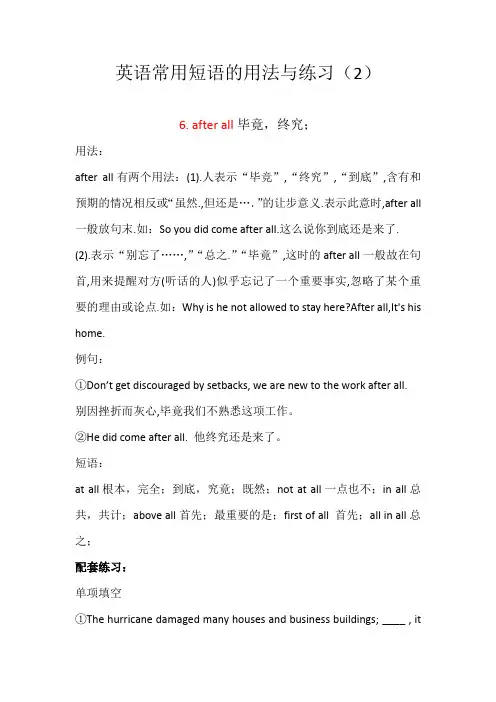
英语常用短语的用法与练习(2)6. after all毕竟,终究;用法:after all有两个用法:(1).人表示“毕竞”,“终究”,“到底”,含有和预期的情况相反或“虽然.,但还是….”的让步意义.表示此意时,after all 一般放句末.如:So you did come after all.这么说你到底还是来了. (2).表示“别忘了……,”“总之.”“毕竟”,这时的after all一般故在句首,用来提醒对方(听话的人)似乎忘记了一个重要事实,忽略了某个重要的理由或论点.如:Why is he not allowed to stay here?After all,It's his home.例句:①Don’t get discouraged by setbacks, we are new to the work after all.别因挫折而灰心,毕竟我们不熟悉这项工作。
②He did come after all. 他终究还是来了。
短语:at all根本,完全;到底,究竟;既然;not at all一点也不;in all总共,共计;above all首先;最重要的是;first of all 首先;all in all总之;配套练习:单项填空①The hurricane damaged many houses and business buildings; ____ , itcaused 20 deaths.A. or elseB. thereforeC. after allD. besides②I’d like to buy a house—modern, comfortable, and ____ in a quiet neighbourhood.A. in allB. above allC. after allD. at all③People may have different opinions about Karen, but I admire her. ____, she is a great musician.A. After allB. As a resultC. In other wordsD. As usual④-- I am sorry I didn't do a good job.-- Never mind. ____, you have tried your best.A. Above allB. In allC. At allD. After all7. all in all 极其重要的;重于一切的;最关心;最爱的;从各方面考虑;从各方面来说;总的来说;例句:①All in all, her condition is greatly improved.总的说来,她的健康状况大大好转。
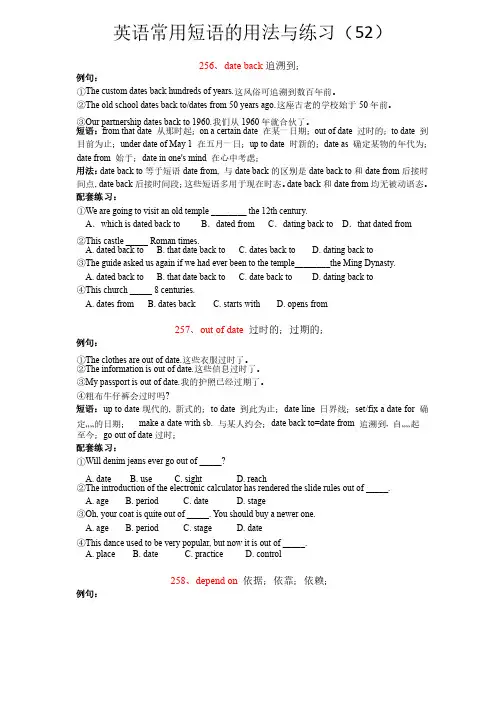
英语常用短语的用法与练习(52)256、date back追溯到;追溯到;例句:①The custom dates back hundreds of years.这风俗可追溯到数百年前。
这风俗可追溯到数百年前。
年前。
②The old school dates back to/dates from 50 years ago.这座古老的学校始于50年前。
年就合伙了。
③Our partnership dates back to 1960.我们从1960年就合伙了。
短语:from that date 从那时起;on a certain date 在某一日期;out of date 过时的;to date 到目前为止;under date of May 1 在五月一日;up to date 时新的;date as 确定某物的年代为;date from 始于;date in one's mind 在心中考虑;在心中考虑;用法:date back to等于短语date from, 与date back的区别是date back to和date from后接时间点, date back后接时间段;这些短语多用于现在时态。
date back和date from均无被动语态。
配套练习:①We are going to visit an old temple ________ the 12th century.A.which is dated back to B.dated from C.dating back to D.that dated from②This castle _____ Roman times.A. dated back toB. that date back toC. dates back toD. dating back to③The guide asked us again if we had ever been to the temple________the Ming Dynasty.A. dated back toB. that date back toC. date back toD. dating back to④This church _____ 8 centuries.A. dates fromB. dates backC. starts withD. opens from257、out of date 过时的;过期的;例句:这些衣服过时了。
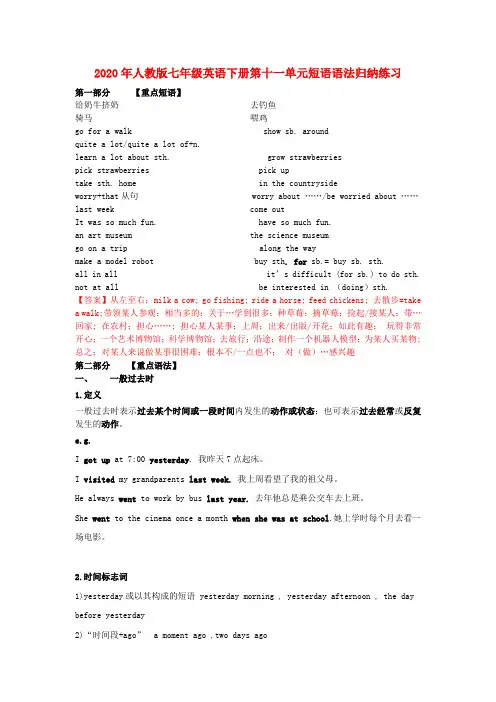
2020年人教版七年级英语下册第十一单元短语语法归纳练习第一部分【重点短语】给奶牛挤奶去钓鱼骑马喂鸡go for a walk show sb. aroundquite a lot/quite a lot of+n.learn a lot about sth. grow strawberriespick strawberries pick uptake sth. home in the countrysideworry+that从句worry about ……/be worried about ……last week come out It was so much fun. have so much fun. an art museum the science museumgo on a trip along the waymake a model robot buy sth. for sb.= buy sb. sth.all in all it’s difficult (for sb.) to do sth. not at all be interested in (doing)sth.【答案】从左至右:milk a cow; go fishing; ride a horse; feed chickens; 去散步=take a walk;带领某人参观;相当多的;关于…学到很多;种草莓;摘草莓;捡起/接某人;带…回家; 在农村;担心……; 担心某人某事;上周;出来/出版/开花;如此有趣;玩得非常开心;一个艺术博物馆;科学博物馆;去旅行;沿途;制作一个机器人模型;为某人买某物;总之;对某人来说做某事很困难;根本不/一点也不;对(做)…感兴趣第二部分【重点语法】一、一般过去时1.定义一般过去时表示过去某个时间或一段时间内发生的动作或状态;也可表示过去经常或反复发生的动作。
e.g.I got up at 7:00 yesterday. 我昨天7点起床。
英语常用短语的用法与练习(14)66. get away with被放过;(做坏事)不受惩罚;例句:①If you cheat in the exam, you’ll never get away with it.考试作弊必予追究。
②I won’t have you getting away with cheating in the exam.我不能容忍你考试作弊而不受惩罚。
③He’s not very good at getting his ideas across.他不太善于清楚地表达自己的思想。
④We should get rid of the bad style and keep the good. 我们应该摒弃不良作风,保持优良作风。
短语:get across=put across (使)被理解;(把……)讲清楚;get rid of 摆脱;除掉;get away (from) (从)……脱离,逃脱……;get down to (doing)sth. 开始认真地做某事;get in 插话;收获;get in touch with 与……取得联系;get into the habit of... 染上……的习惯;get into trouble 陷入困境;get out (of ...) 出去,离开,逃脱,摆脱;get hold of 抓住;get on/along well with...与……相处得好;进展顺利(多用进行时);get over 爬过……;克服(困难);从……中恢复过来;get through 完成;花光(时间、金钱等);通过;接通电话;配套练习:(1). 单项填空:①His mother had thought is would be good for his character to_____from home and earn some money on his own.A. run away B take away C.keep away D.get away②As soon as he got to the office, he______ the students’ papers.A. got down to correctB. got down to correctingC. set down to correctingD. sit down to correcting③The final examination is coming up soon. It's time for us to ____ our studies.A. get down toB. get outC. get back forD. get over④The final examination is coming up soon. It’s time for us to _____ our studies.A. get down toB. get outC. get back forD. get over(2). 完成句子:①To my surprise, the baby wolf _______ (与……相处得不错) the dogs and then managed to survive.②She never arrives on time at the office, but she somehow managed to ______ (侥幸逃脱) it.③Well, stop chatting. It’s time we _______ (开始,着手) some serious work.④The news was a terrible blow to her, but she will ______ (从……恢复过来) the shock soon.67. get into陷入;染上(坏习惯);例句:①I’m really getting into jazz these days.近来我喜欢上爵士乐了。
Unit1 Where did you go on vacation?词语辨析:1.anywhere 与somewhere 两者都是不定副词。
anywhere 在任何地方,常用于否定句和疑问句中。
I can’t find it anywhere. somewhere 在某处,到某处,常用于肯定句。
I lost my key somewhere near here.2. seem + 形容词看起来….. You seem happy today.seem + to do sth. 似乎、好像做某事I seem to have a coldI seems / seemed + 从句看起来好像…;似乎…. It seems that no one believe you.seem like ….好像,似乎….. It seems like a god idea.3. decide to do sth.决定做某事They decide to visit the museum.decide + 疑问词+ 动词不定式He can not decide when to leave.4. start doing sth = start to do sth. 开始,可与begin 互换。
He started doing his homework.但以下几种情况不能用begin .1)创办,开办:He started a new bllkshop last month.2)机器开动:I can’t start my car.3)出发,动身:I will start tomorrow morning.5. over 介词,多于,超过,在…以上(表示数目、程度)= more thanMy father is over 40 years old.在…之上,与物体垂直且不接触,与under 相反。
There is a map over the blackboard.超过:I hear the news over the radio.遍及:I want to travel all over the world.6. too many 太多,后接可数名词复数:Mother bought too many eggs yesterday. too much 太多,修饰不可数名词,修饰动词作状语。
英语常用短语的用法与练习(1)1. above all首先;尤其;最重要的是;例句:①We have all but finished the work.②The day turned out fine after all.③Children need many things ,but above all they need love.④He wasn't at all tired.⑤Do you feel ill at all(真的,确实)?⑥There were twenty in all at the party.⑦Never waste anything, and above all, never waste time.不要浪费东西,尤其是不要浪费时间。
短语:above all是从事物的重要性上说的“首先,最重要的是”。
first of all 是从事物的排列顺序上说的“第一”。
in all表示“总共;总而言之”。
after all表示“毕竟”。
all in all 从各方面考虑;总的来说;not at all 不用;all long 一直,始终;all but 几乎,差点没(=almost,nearly)配套练习:单项填空①—Would you like to see a film with me?—I’d love to, but I cannot; ____ , I am busy. For another, I don’t want to go out today.A. for one thingB. for exampleC. for another thingD. above all②I'd like to buy a house -- modern, fortable, and ____ in a quiet neighborhood.A. in allB. above allC. after allD. at all③In order to continue to learn by ourselves when we have left school, we must ____ learn how to study in the school now.A. in allB. after allC. above allD. at all④I’d like buy a house --- modern, fortable, and _____ in a quiet neighborhood.A. in allB. above allC. after allD. at all2. by accident = by chance偶然;无意中;不小心;用法:by accident,其意为“偶然地”“无意地”,主要用作状语,有时也用作表语。
仁爱英语七年级Unit 1 复习纲要与配套练习本单元讲解要点一.词汇部分(一)背诵短语1. be from 2.Good morning/afternoon/evening.3.thank you 4.in English (二)理解短语 1 excuse me 2.welcome to(三)常用短语1. stand up 2.sit down 3.telephone number 4.years old 5.in the same grade 二.语法部分学习be动词am,is,are的用法及一般疑问句和几种特殊疑问句(1)I 与am用,第三人称单数用is, we, you,they 和复数名词用are(2)一般疑问句要注意的问题:句中有be动词,把be 动词提前,肯定句中的I,my,we,our相应地改为you,your,you,your .三.句型部分1.Welcome to China. Thank you.2.Nice to meet you. Nice to meet you,too.3.Where are you from? I’m from Can ada.4.Excuse me,what is this/that in English? It’s an orange/a car.5.What class are you in? I’m in Class Four,Grade Seven.6.How old is she? She is fourteen.7.Are these/those cars? Yes, they are./No, they aren’t.本话题随堂练习I.单项选择(10题每小题2分满分20分)( )1.—How do you do?--A.How are you ?B. How do you do?C.Fine, thank you.( )2. What’s that in English?________A.This is a book.B.It’s a book.C.That’s a book.( )3. ________is your friend? Jim.A.WhatB.WhereC.Who( )4. What class Maria and Jane in? Maria is in Class One and Janein Class Two.A.are;areB.are;isC.is;is( )5. do you spell “book”? B- O-K,book.A.What;twoB.How,twoC.How;double( )6. Is this car ?Yes.It’s English car.A.a ;anB.a ;aC.an ; an( )7.Excuse me, you Joe? No,I’m not.A. isB. AreC.are( )8.Kate is English .A.an B.a C./( )9.Linder is fifteen old.She is my friend.A. a yearB. yearC.years( )10. are you? I’m thirteen years old.A.How oldB.WhereC.WhoII. 词汇运用(每小题2分,满分20分)(1 )根据句意及首字母提示补全单词。
高考英语常用动词短语高考英语常用动词短语1、look up 查阅2、look after 照料3、look for 寻找4、look forward to 盼望5、look into 调查6、look through 浏览,温习7、put up 建造,举起,张贴8、pick up 拾起,学会9、get up 起床,筹备10、give up 放弃11、come up 出来,发芽,升起12、catch up 赶上13、keep up 保持14、hold up 举起,阻挡15、cut up 切碎16、call up打电话,使…想起17、set up 建立,开业18、sit up 熬夜,坐直19、come down 下来,崩溃,失败20、come along 随同21、come on 赶快,上演,出台,播放22、come in 进来,上市,得到批准23、come out 出来,出版,结果是24、come from 来自,出生在,由……制成25、go on 继续,播放,举办,播放26、go out 出去,熄灭27、go over 检查,复习28、go ahead 干吧,进展,用吧29、go through 通过,审查,完成30、go up 上涨,建造起31、go along with 附和,支持32、fill up 填满33、get on 上车,穿上,上演,举办,播放34、get down 下来,落下,记下,拿下,播放学而时习之高中英语常用短语动词高中英语常用短语动词是指在英语语法中常用的一些动词短语,它们在日常交流和学习中非常常见。
掌握这些短语动词对于提高英语口语和写作能力非常重要。
在高中英语中,一些常用的短语动词包括:1、"get" 短语动词"get" 是一个非常常用的动词,后面加上不同的介词可以构成很多短语动词。
例如:1、get up:起床2、get dressed:穿衣服3、get down:下车4、get along:相处5、get through:完成2、"put" 短语动词"put" 也是一个常用的动词,加上不同的介词可以构成很多短语动词。
初中英语常用的介词短语在初中英语学习中,介词短语是经常出现的语法要点之一。
介词短语在句子中起到连接词与词组的作用,用来描述时间、地点、原因、方式等关系。
掌握常用的介词短语对于提高英语的表达能力和理解能力非常重要。
本文将介绍一些常用的初中英语常用的介词短语,并附上一些例句,供大家参考。
1. in front of(在...前面)- The dog is sitting in front of the house.(那只狗坐在房子前面。
)2. next to(紧挨着,旁边)- My school is next to the park.(我的学校在公园旁边。
)3. at the back of(在...后面)- The teacher is standing at the back of the classroom.(老师站在教室后面。
)4. on the left/right(在左边/右边)- The supermarket is on the left side of the road.(超市在路的左边。
)5. in the middle of(在中间)- The cat is sleeping in the middle of the bed.(猫正在床的中间睡觉。
)6. between...and...(在...和...之间)- The library is between the school and the post office.(图书馆在学校和邮局之间。
)7. at the corner of(在...的拐角处)- The bakery is at the corner of the street.(面包店在街的拐角处。
)8. near(在附近)- There is a park near my house.(我家附近有一个公园。
)9. across from(在...的对面)- The hospital is across from the supermarket.(医院在超市的对面。
英语常用短语的用法与练习(1)1. above all首先;尤其;最重要的是;例句:①We have all but finished the work.②The day turned out fine after all.③Children need many things ,but above all they need love.④He wasn't at all tired.⑤Do you feel ill at all(真的,确实)?⑥There were twenty in all at the party.⑦Never waste anything, and above all, never waste time.不要浪费东西,尤其是不要浪费时间。
短语:above all是从事物的重要性上说的“首先,最重要的是”。
first of all 是从事物的排列顺序上说的“第一”。
in all表示“总共;总而言之”。
after all表示“毕竟”。
all in all 从各方面考虑;总的来说;not at all 不用谢;all long 一直,始终;all but 几乎,差点没(=almost,nearly)配套练习:单项填空①—Would you like to see a film with me?—I’d love to, but I cannot; ____ , I am busy. For another, I don’t want to go out today.A. for one thingB. for exampleC. for another thingD. above all②I'd like to buy a house -- modern, comfortable, and ____ in a quiet neighborhood.A. in allB. above allC. after allD. at all③In order to continue to learn by ourselves when we have left school, we must ____ learn how to study in the school now.A. in allB. after allC. above allD. at all④I’d like buy a house --- modern, comfortable, and _____ in a quiet neighborhood.A. in allB. above allC. after allD. at all2. by accident = by chance偶然;无意中;不小心;用法:by accident,其意为“偶然地”“无意地”,主要用作状语,有时也用作表语。
例句:①Last time I ran across her in the street by accident.上次我偶然在街上碰见她了。
②I only found it by accident.我只是碰巧找到的。
③None of my inventions camebyaccident.我所有的发明都不是偶然的。
by短语:by contrast 对比之下;by mistake 错误地;by hand 用手;用体力;by machine 用机器;配套练习:(1).用“by+n.”构成的短语填空:①I was in such a hurry that I took someone else’s umbrella ______ .②These toys are made ______ instead of _______ , so they are very expensive.③She had found the file ________ .(2).单项填空①Last Sunday I met my first teacher by _____ in a minibus, which is beyond my expectation.A. chanceB. farC. effectD. way②An artist who was recently traveling on a ferry to the southern islanddiscovered ______ a long lost antique Greek vase.A. at randomB. by chanceC. in turnD. on occasion③If by any chance someone comes to see me, ask them to leave a _____ .A. messageB. letterC. sentenceD. notice④Sorry, I took your pen _____.A. by heartB. by mistakeC. on purposeD. by the way3. accuse ...of...因……控告/指责……;用法:accuse的宾语后接of,介词的宾语表示指责或指控的具体内容。
如:accuse sb of carelessness指责某人粗枝大叶;后接复合宾语,宾补由介词as引出。
如:They accused his brother as Smith’s accomplice(帮凶);常用于被动结构中。
如:Of what was the man accused?例句:①I don’t think anyone can accuse him of not being frank.我看谁也不能说他不坦率。
②You can’t accuse Stephen of robbing the bank. He was round at my house all evening.你不能控告斯蒂芬打劫银行,他整晚都在我家。
辨析:accuse/chargeaccuse, charge这两个动词都有“控诉,指控”之意,但它们后面所搭配的介词不同。
accuse v.指控,控诉,常与介词of连用。
charge v.可以指因为小错而受的责备,也可指因违法而受到控告,与介词with连用。
配套练习:单项填空①Tom ___ his boss of having broken his word.A. blamedB. accusedC. chargedD. scolded②The policeman stopped him when he was driving and ___ him of speeding.A. chargedB. accusedC. blamedD. scolded③The soldier was ___ of running away when the enemy attacked.A. scoldedB. chargedC. accusedD. punished④It wasn’t my fault. Don’t worry! I wasn’t ___ you.A. conveyingB. referringC. hearingD. accusing⑤The policeman stopped him when he was driving home and ____ him of speeding.A. warnB. accusedC. chargedD. deprived4. be addicted to对……上瘾;入迷;沉溺于(其中to为介词);addict vt.使……成瘾;addict n. [C] 入迷的人;有瘾的人;addictive adj.使成瘾的;上瘾的;addiction n.沉溺;成瘾;上瘾;入迷;例句:①Schoolboys are easier to be addicted than schoolgirls to net.男生比女生更容易上网成瘾。
②He was addicted to cocaine.他吸可卡因上瘾。
③He was addicted to gambling.他赌博成瘾。
addict短语:be addicted to sth./doing sth.=addict oneself to sth./doing sth. 沉溺于某种嗜好;醉心于某种活动配套练习:单项填空①Her husband is so ___ to smoking that he can’t give it up.A. addictingB. addictiveC. addictedD. addiction②The parents felt helpless when they found their son had ___ love stories for long.A. addictB. addictedC. been addicted toD. addicted himself③She says she’s unable to give up smoking; she’s completely ___.A. addictingB. being addictedC. addictedD. having addicted④I shouted at him, but he couldn’t hear me. He ___.A. was addicted to readB. became addicted to readingC. became addict to readingD. was addicted in reading⑤Although she is only 17 years old, she ____ drugs for two years.A. AddictsB. has addicted toC. has addictedD. has been addicted to5. in addition (常与to连用)此外;用法:in addition是介词短语,作副词用,相当于词组as well,其后不能跟名词或其他任何成分,一般位于两个句子中间或置于句末。
位于两个句子中间时,常用逗号与句子隔开。
in addition to是介词短语,其后接名词或代词等作其宾语,意义大体相当于as well as和besides。
例句:①There are many shops around the railway station. In addition, there are some newlybuilt hotels there.火车站附近有很多商店,此外,那里还有一些新建的旅馆。